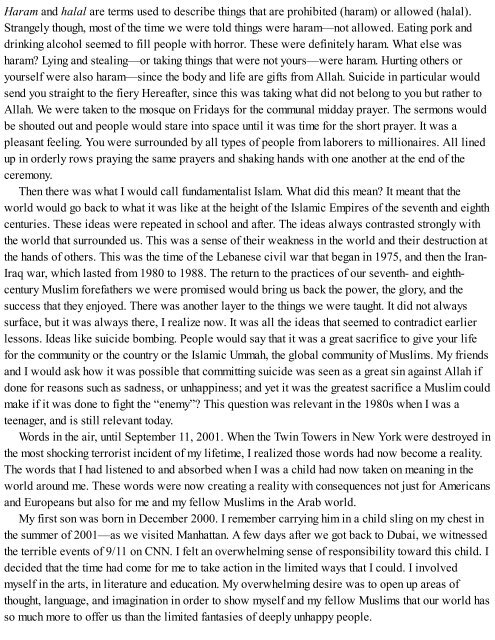1250119847
Create successful ePaper yourself
Turn your PDF publications into a flip-book with our unique Google optimized e-Paper software.
Haram and halal are terms used to describe things that are prohibited (haram) or allowed (halal).<br />
Strangely though, most of the time we were told things were haram—not allowed. Eating pork and<br />
drinking alcohol seemed to fill people with horror. These were definitely haram. What else was<br />
haram? Lying and stealing—or taking things that were not yours—were haram. Hurting others or<br />
yourself were also haram—since the body and life are gifts from Allah. Suicide in particular would<br />
send you straight to the fiery Hereafter, since this was taking what did not belong to you but rather to<br />
Allah. We were taken to the mosque on Fridays for the communal midday prayer. The sermons would<br />
be shouted out and people would stare into space until it was time for the short prayer. It was a<br />
pleasant feeling. You were surrounded by all types of people from laborers to millionaires. All lined<br />
up in orderly rows praying the same prayers and shaking hands with one another at the end of the<br />
ceremony.<br />
Then there was what I would call fundamentalist Islam. What did this mean? It meant that the<br />
world would go back to what it was like at the height of the Islamic Empires of the seventh and eighth<br />
centuries. These ideas were repeated in school and after. The ideas always contrasted strongly with<br />
the world that surrounded us. This was a sense of their weakness in the world and their destruction at<br />
the hands of others. This was the time of the Lebanese civil war that began in 1975, and then the Iran-<br />
Iraq war, which lasted from 1980 to 1988. The return to the practices of our seventh- and eighthcentury<br />
Muslim forefathers we were promised would bring us back the power, the glory, and the<br />
success that they enjoyed. There was another layer to the things we were taught. It did not always<br />
surface, but it was always there, I realize now. It was all the ideas that seemed to contradict earlier<br />
lessons. Ideas like suicide bombing. People would say that it was a great sacrifice to give your life<br />
for the community or the country or the Islamic Ummah, the global community of Muslims. My friends<br />
and I would ask how it was possible that committing suicide was seen as a great sin against Allah if<br />
done for reasons such as sadness, or unhappiness; and yet it was the greatest sacrifice a Muslim could<br />
make if it was done to fight the “enemy”? This question was relevant in the 1980s when I was a<br />
teenager, and is still relevant today.<br />
Words in the air, until September 11, 2001. When the Twin Towers in New York were destroyed in<br />
the most shocking terrorist incident of my lifetime, I realized those words had now become a reality.<br />
The words that I had listened to and absorbed when I was a child had now taken on meaning in the<br />
world around me. These words were now creating a reality with consequences not just for Americans<br />
and Europeans but also for me and my fellow Muslims in the Arab world.<br />
My first son was born in December 2000. I remember carrying him in a child sling on my chest in<br />
the summer of 2001—as we visited Manhattan. A few days after we got back to Dubai, we witnessed<br />
the terrible events of 9/11 on CNN. I felt an overwhelming sense of responsibility toward this child. I<br />
decided that the time had come for me to take action in the limited ways that I could. I involved<br />
myself in the arts, in literature and education. My overwhelming desire was to open up areas of<br />
thought, language, and imagination in order to show myself and my fellow Muslims that our world has<br />
so much more to offer us than the limited fantasies of deeply unhappy people.
















